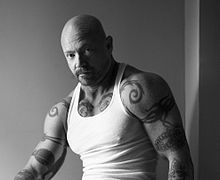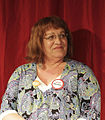Portal:Transgender
Welcome to the Transgender portal Being transgender is distinct from sexual orientation, and transgender people may identify as heterosexual (straight), homosexual (gay or lesbian), bisexual, asexual, or otherwise, or may decline to label their sexual orientation. The opposite of transgender is cisgender, which describes persons whose gender identity matches their assigned sex. Accurate statistics on the number of transgender people vary widely, in part due to different definitions of what constitutes being transgender. Some countries, such as Canada, collect census data on transgender people. Generally, fewer than 1% of the worldwide population are transgender, with figures ranging from <0.1% to 0.6%. Many transgender people experience gender dysphoria, and some seek medical treatments such as hormone replacement therapy, gender-affirming surgery, or psychotherapy. Not all transgender people desire these treatments, and some cannot undergo them for financial or medical reasons. The legal status of transgender people varies by jurisdiction. Many transgender people experience transphobia, or violence or discrimination towards transgender people, in the workplace, in accessing public accommodations, and in healthcare. In many places, they are not legally protected from discrimination. Several cultural events are held to celebrate the awareness of transgender people, including Transgender Day of Remembrance and International Transgender Day of Visibility, and the transgender flag is a common transgender pride symbol. (Full article...) Selected article Non-binary is a spectrum of gender identities that are not exclusively masculine or exclusively feminine—identities that are outside the gender binary. Genderqueer is an earlier term with the same meaning, originating from queer zines of the 1980s. Non-binary people may identify as having two or more genders (being bigender or trigender) having no gender (agender, nongendered, genderless, genderfree or neutrois); moving between genders or having a fluctuating gender identity (genderfluid); being third gender or other-gendered (a category that includes those who do not place a name to their gender). Gender identity is separate from sexual or romantic orientation, and non-binary people have a variety of sexual orientations, just as transgender and cisgender people do. A non-binary gender is not associated with a specific gender expression, such as androgyny. Non-binary people as a group have a wide variety of gender expressions, and some may reject gender "identities" altogether.
Selected biographyBuck Angel (born June 5, 1962) is an American sex educator and a former pornographic film actor and producer. He founded the media production company Buck Angel Entertainment. A transgender man, he currently works as an advocate and educator. Angel served on the board of directors of the Woodhull Freedom Foundation from 2010 to 2016; the foundation works to affirm sexual freedom as a fundamental human right through advocacy and education. Did you know (auto-generated) -
This month's birthdays
More did you know...
Random quoteThey can try to ban us. They can try to get rid of our health care. They can try to deny us housing, credit, and public accommodations. They can try to shame us. They can try all they want to erase us, but at some point, they will realize the trans community is never going away. Trans people are everywhere. Every country, every race, every ethnicity, every religion, every socioeconomic level, every period of human history — we are everywhere. We are natural. You can’t rid of what’s natural. I think they know that, and it terrifies them. Related portalsSelected picturesTopics
CategoriesWikiProjects WikiProjects are non-hierarchical peer-run groups which serve as a resource for the communication on, and collaboration of, content within a specific topic area. Related WikiProjects: Things you can do
Associated WikimediaThe following Wikimedia Foundation sister projects provide more on this subject:
|






























